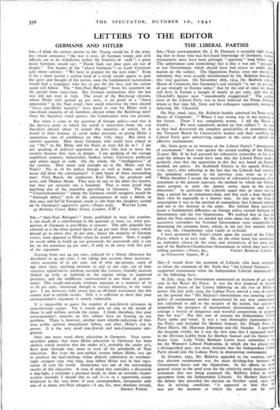THE LIBERAL PARTIES
Snt,—Your correspondent Mr. J. H. Flexman is certainly right in say. ing that to those who had first-hand lulowledge of Germany, Gertna, rearmament must have been glaringly " apparent," long before ton The unfortunate (and astonishing) fact is that it was not "apparent' to our Government, which should have had access to ample inint, mation on the subject. The Opposition Parties were not merely a informed, they were actually misinformed by Mr. Baldwin himself on this vital question. On November 28th, 1934, Mr. Baldwin told ihn House of Commons that Germany's real strength "is not 50 per cent of our strength in Europe today," that by the end of 1935 we should still have in Europe a margin of nearly so per cent., and that mt. Churchill's figures were "considerably exaggerated." The cardinal error of the Liberal Party was to have believed the Prime Minister whom at that time Mr. Stein and his colleagues supported, instead of believing Mr. Churchill.
On May 22nd, 1935, Mr. Baldwin frankly admitted his %rror to ttin House of Commons. (" Where I was wrong was in my estimate el the future. There I was completely wrong. I tell the House ni frankly. . . . We were cosnpletely misled on that subject.") As no as they had discovered the complete unreliability of statements from the Treasury Bench by Conservative leaders and their satellites, tht Liberal Party gave unwavering support to the cause of speedy and effective rearmament.
Mr. Stein gives as an instance of the Liberal Party's ." denunciation of rearmament" their vote against the second reading of the Defence (Loans) Bill If he had pursued his exhaustive researches so far as to read the debates he would have seen that the Liberal Party made a perfectly clear that the opposition to this Act was based on financial method, not policy. Sir Archibald Sinclair in his speech (February 17th, 1937), after referring to the fact that the Liberals had voted for the armament estimates in the previous year, went on to say: "While therefore I accept the necessity of substantial measures of re- armament at the present juncture, the method by which the Govern- ment propose to raise the money seems open to the gravest objections." In particular the Liberals urged _that 30 years was too long a period for an armaments-loan, and that such a loan should in their view be repayable in a shorter time. SO also on the issued conscription it was to the method of compulsion that Liberals objected and not to the increase in the army. But behind these particular issues a, fundamental difference on foreign policy existed between the Government and the two Oppositions. We realised that to face and defeat the Nazi menace we needed not arms alone but allies. By then successive surrenders the National Government were responsible for destroying the common front, which, in the last few months before the war, Mr. Chamberlain tried vainly to re-build.
I have answered Mr. Stein's attack upon the record of the Liberal Party, which is an easy task. He, on the other hand, has maintained an unbroken silence on the votes and abstenticns of his own party and of the Baldwin-Chamberlain Government in which they were such


























 Previous page
Previous page